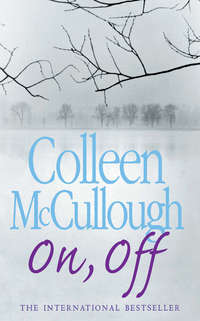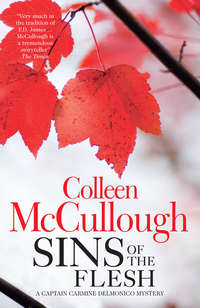
Полная версия
Naked Cruelty
“You shouldn’t associate yourself with this investigation,” he said in a scolding voice. “This Dodo might see you.”
“Oh, Kurt, honestly! I live in a security apartment, not the top floor of a two-family house,” she said, exasperated. “I’m a cop! A professional cop who graduated at the head of the NYPD academy, what’s more. The Dodo’s not that stupid. Like all predators, he goes after prey he knows he can handle. I swear on your starched-up Lutheran God that he couldn’t handle me.”
“Do not take the name of God in vain!” he said, horrified.
“Bah, humbug !” she said, laughing at his seriousness.
Just behind them, Carmine and Nick walked with Mason Novak, and behind them were Bill Mitski, Mark Sugarman and Greg Pendleton.
“You were Shirley Constable’s friend, right?” Nick asked Mason Novak.
“Yes.”
“Have a talk to Delia Carstairs in about five days’ time. She’ll be able to advise you by then.”
“I think Shirley’s retreated too far to be saved,” Mason said miserably. “She won’t even let me be in the same room.”
“Too pessimistic, Mr. Novak. We cops have seen Dr. Liz Meyers in action, and she’s something else.”
Didus ineptus heard that conversation as well as several others, and ground his teeth—but inaudibly. There was no point in belonging to the Walkers if he didn’t utilize every asset this association of men owned. He hadn’t been among the first to join, but he wasn’t among the last either; to sit in the middle was ideal, for the middle was always a clump, a jumble, a crowd.
I should have killed Maggie Drummond, he was thinking. What’s the difference between detection thanks to a woman too stupid to keep her mouth shut, and the discovery of her dead body? The body is preferable, but it’s too late now. Because I left her alive, the cops know about me and my methods. Protective custody, eh? She’s safe. Move ahead, Didus ineptus! Maggie Drummond had recognized the name, the taxonomy too. Would the cops deem him an untutored ignoramus, not to know about Raphus cucullatus? The wop captain was educated and intelligent, but was he subtle? It would take a very subtle man to unravel all the strands that tied and trussed the Dodo.
In his heart he’d known that Maggie Drummond meant trouble, but he had to have her. Such a glorious neck! Long and slender, curved like a swan’s. The only one on his list whom he could bear to throttle first—all others paled. Yes, yes, yes, she was trouble! But if he kept her alive, he could go back for a second visit, do it all again. Work her throat to death then.
Whenever they had met he had actively disliked her, an emotion their conversations had revealed she reciprocated. And he had done battle with his extinct bird: fierce battle. It had won, and now the cops knew all about him. No, not all. Just far too much.
Waving and calling messages, he climbed into his car and drove away down Cedar Street toward Carew.
A disappointed and disgruntled Kurt von Fahlendorf turned into the blind little pocket of Curzon Close and put his black Porsche away in its garage. Having seen for himself that the electric door came fully down, he walked not toward his house but to a spot on the kerb where a gap in the trees permitted a view of the night sky. So wonderful! Yet not, he acknowledged, in the same league as southern hemisphere skies, free from humanity’s lights and displaying the whole gauzy panoply of the Milky Way. After he gained his basic science degree it had been a struggle: did he pursue astrophysics, or particle physics?
Tonight he had felt like taking Helen to the Motown Café for a drink and dance, but she hadn’t wanted to; this wretched detective’s job of hers had eaten into her leisure a little. But if he star-gazed for a few minutes in peace and quiet, he would forgive her. He always did forgive her.
“Star-gazing, Kurt?” a voice asked.
Oh no! The Warburtons.
“Having been underground or indoors all day and evening, the rising winter stars are better than a glass of Moët,” he said, keeping the annoyance out of his answer. If the Warburtons thought they were getting under one’s skin, they’d never leave.
“No walking tonight?”
“At this hour? No, a Walkers’ meeting. Why not join, Robbie?”
Came a whinny of laughter, curiously amplified; Gordie was there too—when was he not?
“Dah-ling!” Gordie exclaimed, coming to stand under the lamp. “So much Teutonic seriousness! Robbie and I would be as much use to the Gentleman Walkers as Dame Margot Fonteyn.”
Kurt couldn’t help his lip, which lifted in contempt. “You are correct,” he said, his voice betraying only the slightest trace of an accent. “I will contact Dame Margot tomorrow.”
“No Helen?” Robbie asked maliciously.
“Helen is in the police. Tonight she is on duty.”
“Oh, my!” said Gordie. “A face that could launch a thousand ships, blue blood, and a mind in the Holloman sewers.”
When they bunched into fists it could be seen that Kurt’s hands were big; they bunched. “Retract that, you slimy worm, or I will insert Robbie’s head all the way up your arse.”
The twins backed away in a scuttle, only half afraid because that was their nature: pull the cat’s tail and get out of the way of its claws. “Silly!” Robbie cried. “If your English were more locally colloquial, you’d realize what he said was a clever pun.”
“In a pig’s eye it was,” said Kurt, demonstrating just how colloquial he could get. He turned on his heel and walked off.
The twins watched him go, looking at each other in glee.
“He’s so thin-skinned,” Robbie said, putting his arm around Gordie’s waist and turning toward their house.
“Prussians were never my favorite people,” Gordie said.
“How many have you met, sweetest?”
“Kurt.”
“They say he’s loaded. Oh, and that face! It’s to die for. Why didn’t Mother Nature give us Kurt’s face?”
“Our face is fine, it suits our style,” said Gordie. “We have plasticity! Kurt has the face of a marble statue.”
“True, true. They say his papa has an enormous factory.”
“Which little bird twittered that?” Gordie demanded.
“Babs, the waitress in Joey’s diner.”
“Is there anything Babs doesn’t know?”
“The identity of the fellow WRHM and HN are calling the Dodo.”
“A putrid fowl.” Gordie shuddered.
They walked together through their red-lacquered front door and divested themselves of their jackets: a dark grey one for Robbie and an ecru one for Gordie.
“Dark—light—dark—light—dark—light,” Gordie chanted, skipping nimbly from a black tile to a white one on the tesselated floor, a caricature of an over-sized child.
“Stick to the white,” Robbie said, leaping on a black tile.
“Light!” said Gordie, on a white tile.
“Dark!”
“Light!”
“Dark!”
“Light!”
Which finished their dance; they had reached the living room doorway and encountered a geometrically crazed carpet in black and white. Laughing, they flopped into easy chairs, Gordie in a white one and Robbie in a black one, breathless and happy.
“Do you think it’s time we told Aunt Amanda where we are?” Gordie asked.
“Patience, twinnie-winnie, patience.”
“Our clown and check will go to San Diego, and you know we’re renting the house to strangers. What if they pinch our present?”
But Robbie’s mind still dwelled on their neighbor.
“There was a professor named Kurt
Who wore a plutonium shirt;
A mushroom-shaped cloud
Did Kurt really proud
When the garment proved far from inert.”
“Very good, Robbie! I love your limericks.”
“The Dodo’s victims do have one thing in common,” Delia said the following Monday, the last day of the month.
“Expound,” said Carmine.
“None of the seven has what I’d call a menial job, though there are several thousand Carew women working at menial jobs. Shirley is an archivist—extremely thin on the ground. Mercedes is a dress designer, but not a struggling would-be. She’s the chief designer of that famous boutique line, “Cobweb”. Leonie’s a brilliant mathematician, working at Chubb and surrounded by men who regard her as a freak. Esther was on a fast track at East Holloman State College teaching the more esoteric aspects of commerce— apparently her teaching abilities were outstanding. Marilyn is the one I’d call unlucky, in that she should have been in Alberta working the digs there—she came home unexpectedly. No, the Dodo didn’t send her any trick messages, the summons was genuine. Natalie buys women’s clothes from factories for Huxley’s department stores. She has an unerring instinct for what women are going to want to wear, so Huxley’s are feeling her absence severely. And Maggie, as we all know, is a bird physiologist at Chubb, no mean feat,” Delia said.
“That’s an impressive list, even for 1968,” said Helen, taking over from Delia. “It suggests to us that the Dodo is well aware what his victims do professionally. He’s an intellectual snob, and we’re guessing that file clerks, waitresses and cleaning ladies are safe. Also undergraduates. All his victims so far have been old enough to acquire at least one degree.”
“How does he find out their professions?” Carmine asked with a frown. “There’s a list of Gentleman Walkers and their occupations, but the most Sugarman does with women is to write them down on his list for a party. Helen, your job is to check how many of them are on Sugarman’s party lists. We can’t hope for that from Mason Novak, he’s too disorganized.”
“He must be organized at work,” Delia said.
“You’re right, he must be. However, the Walkers have no idea from seeing a girl out and about in Carew whether she’s a doctor or a file clerk. The Dodo must find out the hard way, by multiple break-ins. A woman’s living space will tell him for sure. But it adds to the danger of discovery.”
“File clerks don’t carry heavy briefcases,” said Nick.
“No, I believe the Dodo has access to records of some sort. What throws me off are the non-academics,” Delia said. “Two of them, a dress designer and a dress buyer. Both women’s wear, yet not really related. How does one find out about them?”
“Walk up to them in a shop and ask, with a very charming smile?” Nick said, half joking.
“He’s a snob in all kinds of ways,” said Helen, tired of Nick. “He doesn’t use a foreign object during his rapes, except maybe his fist, but that’s a part of his body. It interests Delia and me that the most strenuous tussles he had with his victims were before he put socks on their feet and cut their nails. We think he’s taking precautions for later in the night, when he might flag a little himself. Those long, huge erections must take a heavy toll. I mean, sex is a pleasure, but it’s also something you have to work at, especially the man.”
“Has anything further turned up about the books? It seems weird to me that the victims don’t remember a title,” Carmine said.
What a pertinent way to change the subject, Helen thought. The boss could see my frankness made Nick uneasy, so Carmine to the rescue of a fellow man.
Delia answered. “The smallest library held three hundred books, and all of them contained at least a hundred novels. Most of the novels were old and hadn’t been read in years. All the victims could have named a purloined textbook, but an old novel? They knew one had gone because the shelf held a gap where no gap had been before.”
“That says it wasn’t a beloved novel, like Little Women—its absence would have been noticed,” said Helen.
Carmine caught the gleam in Nick’s eye and got in first. “I estimate that we have a little over two weeks before the Dodo rapes again. If, that is, he sticks to his three-week cycle.”
Helen jumped, suddenly very excited. “Captain, what if I set myself up as a lure? He might go for it.”
The shake of Carmine’s head was emphatic. “You’re not thinking straight, Helen. This guy doesn’t choose at random, he’s working from a list he’s already drawn up. It’s not impossible that you’re on it, but nothing indicates that. He’ll know you’re a cop, and I would have said that’s not a profession he’d deem worthy of his attention.” He grinned. “Sorry, but it’s a fact.”
She subsided. “Yes, Captain, you’re right.”
“If the Dodo also happens to be a Gentleman Walker,” Delia said, looking businesslike, “then he can’t be rostered for walking on an attack night. So I took all Mark Sugarman’s rosters and went through them.” She grimaced, revealing lipstick on her teeth. “No correlations, Carmine—not a sausage. I could have skimmed through the lot in less than thirty minutes if Mason Novak didn’t do a good half of them—untidy! But there’s nothing to find, except that I suppose nothing is something.”
Carmine grinned, black brows flying high. “Who’s a nothing that could be a something, Deels?”
“Sixty-one names that never occur on a Dodo night. However, some are bigger somethings than others,” said Delia, smiling. “I mention Mark Sugarman and his two companions—er … Arnold Hedberg and Gregory Pendleton, and Kurt von Fahlendorf and his two—Dapper Dave Feinman and Bill Mitski. The list is on your table. Would you like me to try fishing for alibis?”
“For the moment, no. It’s negative evidence at best, and the only guys who’ll be able to supply alibis are the diarists. Work with the victims, you have their trust.”
“What about me?” Helen demanded.
“Your schedule says you’re with Lieutenant Goldberg and the armed holdups,” said Carmine, sounding adamant. “It’s suddenly gone state wide and is being worked from Hartford with Lieutenant Goldberg in command, so it will be invaluable experience.”
“What about you?” Helen asked, then bit her lip: it had come out far too insolently. Oh, damn cops and their armed services style protocols! Why couldn’t a person ask?
No change in Carmine’s expression occurred, though Nick looked annoyed. “I have the Big Three to worry about,” he said levelly. “Sugarman, Novak and von Fahlendorf.”
“Oh, Kurt’s all right,” Helen said blithely.
“No one is all right, Miss MacIntosh, until I say so.”
“Ow!” Nick exclaimed, laughing. Serves you right, you pushy little bitch, he thought.
Chapter II
The Glass Teddy Bear gift shop actually showed to best advantage after the Busquash Mall had closed its ornate doors and before the timer turned the shop’s interior lights out. No customers disturbed the glitter from arrays of exquisite wine or water glasses, the sparkle from cut crystal vases, the gleam from transparent plates, cups, saucers, ornaments and paperweights. It was a cavern filled with pools and points of light arising out of mysterious shadows, an effect enhanced because every background thing was painted black, or covered in black.
All else paled in contrast to the glass teddy bear himself. He sat in the window on a black velvet box, all alone, glowing like a phosphorescent sea creature. His plump body, legs, arms and head were colorless, made of glass so flawless it held not a single air bubble. His legs stretched out in front of his body, the pads on the bottom of his feet a clear yet satiny ice-blue, each surrounded by stitches in glass thread of a darker blue. One arm was slightly forward of the body; the other was extended in mute appeal. Each had an ice-blue, satiny paw pad. The little round ears were lined with the same glass as his pads, and his face, mouth fixed in a joyous smile, bore two huge, starry eyes of a deeper blue. Though of itself the bulk of his glass had no color, this genuine work of art picked up the blue of paw pads, ears and eyes, and shimmered as if an invisible palest blue flame rendered him incandescent.
Most amazing of all was his gigantic size: about the same as a hefty three-to-four-year-old child.
Though to some extent the shop was still illuminated from the Mall, the lights inside the shop had been out for five hours when the unfaltering forest of pinpoints and pools shivered, some snuffed out, some diminished, others unaffected. The door from the service corridor into the shop’s back room had opened, and remained open as a dark form passed back and forth through it, lugging plastic trash bags. This done, the door closed and a battery-powered lamp came on. From its position atop a filing cabinet, its rays lit up the curtain of glass beads, a frozen waterfall, that barred entrance to the shop itself. The dark form gathered the curtain up and tied all its fabulous ropes against the jamb. A trash bag disappeared into the shop, and came the noises of cans colliding, bottles clinking, boxes and cartons thudding, wet squelches from cascading organic matter. The bag emptied, the form went back to fetch another bag, empty it in a different place. Ten bags in all—more than enough.
The smell of decay was rising as the dark form moved then to the front of the shop, where the glass teddy bear sat on his black velvet box and the night lights from outside made him glow with a dimmer fire. Whoosh! A cloud of dust and debris flew from the smaller bag that the dark form held out and flapped; the glass teddy bear’s luminescence was extinguished under a pall of sticky, grimy vacuum cleaner residue.
There were several more whooshes in other parts of the shop, then the dark form released the bead curtain, which fell into place with a series of chimes that plastic beads could never produce. A knife came out to slash the strands holding the beads; it hovered, undecided, then the dark form snapped the knife closed, and the bead curtain was safe.
The Vandal moved into the back room, collected his flashlight from the filing cabinet, and let himself out. A good exercise … That idiot Charlie the Mall owners employed as their sole night watchman was on his coffee break, regular as the clock he consulted. How come such fools had the money and power to erect something as fine as this shopping mall, then didn’t see the virtue of good night security? They asked for everything they got. And, come to think of it, he could do with a second visit tonight.
From the Glass Teddy Bear he went down to the Third Holloman Bank, whose premises, inside a very up-market mall, boasted little in the way of precautions like time-locked vaults—no need, in a venue where the clients were after cash or validation of checks. He disarmed the device in the service hall, let himself in, and went straight for the cage wherein Percy Lambert kept his cash ready for the morning. Who would ever have thought that these keys would prove so handy? People were so careless! The fifth key fitted the lock, the door opened; the Vandal strolled in and helped himself to $50,000 sitting on the table in preparation for apportioning to the tellers’ drawers in the morning.
By four a.m. it was all over; the Vandal drove off just as Charlie was starting his rounds. He wouldn’t even notice, thought the Vandal, taking a bet with himself. It would take Miss Amanda Warburton and Mr. Percy Lambert to raise the alarm when they came in at eight.
Amanda Warburton smelled the damage before she set eyes on it, so stunned that she dropped the leashes in her left hand and ran into the shop feeling as if someone had cut off air to her lungs. Gasping, choking, she took in the enormity of this crime, and found herself unable to scream. Instead, she used the phone in her back room to call the Mall manager, Hank Murray. Because she was fifteen minutes earlier than Percy Lambert on this first day of October, Hank came racing with his bottle of emergency brandy and some paper cups oblivious to how bad his morning was going to get, intent only on Amanda.
“Oh, Miss Warburton, this is terrible!” he cried after one horrified glance into the shop. “Here, sip this, it will make you feel better. It’s only brandy—the best thing for shocks.”
He was a presentable man in his early forties whom Amanda had liked on her few meetings with him, so she sipped obediently and did indeed feel some strength flow into her.
“What did he do to the glass teddy bear?” she asked, tears coursing down her face. “Tell me the worst, please!”
Having assured himself that she wasn’t going to pass out, he toured the glass shop, more astonished now than horrified—what was this guy about, for God’s sake?
“Everything’s covered in filth, Miss Warburton,” he said, returning, “but it looks as if nothing’s been damaged—not even a chip. The glass teddy bear is fine underneath his dirt.”
“Then why—? What—?”
“I don’t know, except that it’s vandalism,” Hank Murray said in a soothing voice. “Because your stock is glass, it won’t suffer once it’s been properly cleaned. I know a firm will guarantee to clean up your shop as if none of this ever happened, honest. All we have to do is catch the Vandal, who couldn’t have done this if we had better night security.” He squared his shoulders. “However, that’s my business, not yours. Do I have your permission to get things rolling, Miss Warburton?”
“Yes, of course, Mr. Murray.”
“Call me Hank. Are you insured for this kind of thing?”
“Yes.”
“Then it really isn’t a problem. Have you got a card for your insurance agent? I’ll have to see him too, and he’ll have to see this.” He gave a rueful laugh. “I guess I sound cold-blooded, but I have to get things started for you, especially if Mall rumor says aright.”
“What does it say?”
“That you’re alone in the world.”
“Except for a pair of very unsatisfactory nephews, rumor is true,” she said.
“Are the nephews hereabouts? May I call them?”
“No, they’re in San Diego. I’d rather you called Marcia Boyce— she’s my friend and lives next door to me.”
His hazel eyes showed concern for her, his attractive face very serious. “I’m afraid I have to call the police. Too much malice for simple vandalism, and I don’t understand why, if the culprits are simple vandals, they didn’t break anything.”
“Nor do I, frankly. Yes, I have to notify the police.”
Her phone rang; Hank answered it, growing stiffer by the second. When he put the receiver down he stared at Amanda in a new horror.
“You wouldn’t read about it, the Third Holloman Bank has been robbed. Looks like the Vandal was more than a vandal. Will you be all right until I can get Miss—Mrs.—Boyce here?”
“Yes, Hank, I’m over the worst. You go. I’ll call Marcia—she’s Miss Boyce—myself. I’m okay, truly.”
Only when Hank was gone did Winston make his presence felt with a long, highly displeased meow.
Amanda gasped. “Winston! And Frankie! Where are you?”
A growl in what sounded like a very big cat’s throat took Amanda’s eyes to a filing cabinet tucked in a corner; it didn’t meet the wall, which was on an angle, and two pairs of eyes stared at her reproachfully. But they wouldn’t come when she called—they were as upset as she was, obviously—so she had to go to them and remove their body harnesses; they walked on leashes with her to and from the car every day she opened her shop.
Winston, which had paws the size of a lion’s, it seemed to people meeting it, promptly took its twenty pounds to the top of the filing cabinet and hunched there, a magnificent marmalade in color, with unusual green eyes. The dog, which most people judged a pit bull and steered a wide berth around, was black-and-white, its ugly white head adorned with a black ring around its right eye. In actual fact Frankie was a gentle soul utterly dominated by the cat, to which it was passionately attached. Both animals were males, and both castrated.
At the end of a ten-minute sulk, the cat gave the dog its permission to go to Amanda, who clutched at its muscular back as if to a lifeline. What had happened? Who hated her enough to do this? The stench turned her stomach, but she couldn’t leave until the police came, and even then, she needed Marcia to drive her home, not trusting her own ability.
Two patrol cops arrived first: Sergeant Ike Masotti and his long-time partner, Muley Evans. Though Amanda couldn’t know it, she had drawn the best team on patrol in the Holloman PD.









